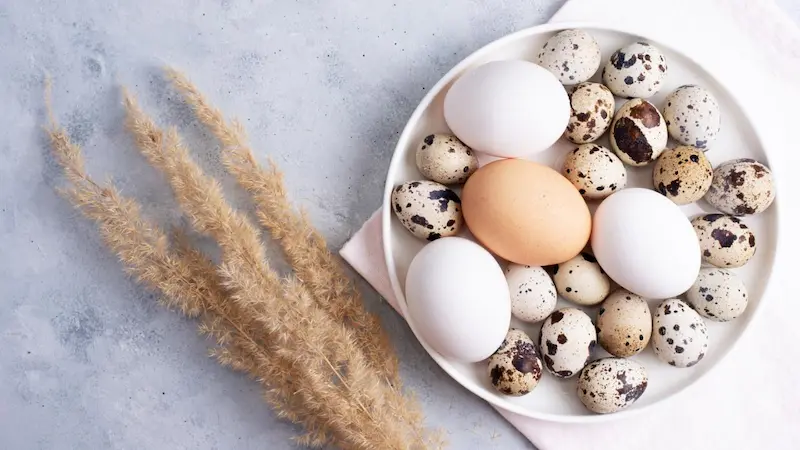Have you ever savored quail eggs? If not, you might consider doing so. These eggs, diminutive yet potent, constitute a superfood brimming with myriad health benefits. Within this discourse, we shall unveil everything essential regarding Japanese quail eggs. Delve into their classification as superfoods, optimal consumption quantities, selection and procurement insights, seamless integration into dietary regimens, and beyond. Brace yourself to unearth one of the paramount dietary additions promoting holistic health and well-being.
What Are Quail Eggs and How Are They Obtained?
This egg, true to its name, derives from the oviparous output of quail birds. These diminutive, swift, and lively creatures trace their roots to Asia, Africa, and Europe, now flourishing in diverse corners of the globe. While several quail species exist, the Japanese quail (Coturnix japonica) is the most prolific egg producer. Quails sustain themselves on an assorted diet of seeds, grains, grasses, insects, and worms.
Procuring quail eggs involves housing these birds within enclosures or cages, ensuring ample sustenance, water, light, and space. Quails typically commence laying eggs around six weeks of age, capable of producing an egg per day, summing up to approximately 300 eggs per annum.
How Do Quail Eggs Differ from Chicken Eggs?
Quail eggs markedly contrast in size from chicken eggs, with an average quail egg weighing around 10 grams, whereas a typical chicken egg weighs approximately 50 grams. Hence, it takes four to five quail eggs to substitute for a single chicken egg in recipes.

In appearance, they exhibit disparate hues and shapes compared to chicken eggs. Quail eggs typically present an oval shape with subtly rounded tips, whereas chicken eggs tend to be more elliptical, featuring more pronounced tips. Notably, quail eggs offer a distinct taste and texture compared to their counterparts. They exude a sweeter, creamier, and finer quality compared to the neutral, denser, and coarser texture of chicken eggs. Furthermore, they harbor a smaller yolk-to-white ratio, rendering them lower in fat and calories relative to chicken eggs.
Why Are Quail Eggs Considered a Superfood?
Quail egg earns their superfood status due to their richness in proteins, vitamins, minerals, antioxidants, and other vital nutrients crucial for one’s health. Compared to chicken egg, quail egg boast higher levels of protein, iron, phosphorus, potassium, zinc, selenium, and vitamin B12. Additionally, they contain vitamin A, vitamin E, vitamin K, folic acid, biotin, choline, and lecithin. Remarkably, quail eggs are low in calories, with just about 14 calories per egg.
These eggs offer numerous health benefits, including:
- Strengthening the immune system and bolstering infection resistance
- Enhancing vision and eye health
- Facilitating bone, muscle, skin, hair, and nail growth and development
- Regulating blood sugar levels and averting diabetes
- Lowering cholesterol and blood pressure levels, preventing cardiovascular diseases
- Improving brain function and memory
- Reducing stress and depression while enhancing mood
- Enhancing fertility and reproductive health
- Aiding in weight loss and maintaining a healthy body weight
How to Consume Quail Eggs?
Quail eggs offer versatile consumption methods, tailored to individual tastes and preferences. They can be boiled, baked, fried, scrambled, integrated into salads, soups, sandwiches, pastries, cakes, and various other recipes, or even consumed raw. Possessing a mild, sweet taste akin to chicken eggs, quail eggs exhibit a finer, softer shell. They peel effortlessly, yet care should be taken to avoid damaging them. Peeling can be done manually or using a specialized knife or scissors. When consuming raw quail egg, ensure they are fresh, clean, and thoroughly washed.
If opting for raw consumption, indulge in them on an empty stomach in the morning, refraining from eating for at least half an hour afterward. A complete daily dose is taken at once, ingesting the entire egg. During this therapy, it’s advisable to abstain from alcohol. Furthermore, nutritionists recommend them for growing children and individuals experiencing reduced appetite or decreased food cravings.
How Many Eggs Can You Consume Daily?
While incredibly nutritious and beneficial, consuming quail eggs shouldn’t occur limitlessly. As with any food, moderation is key, necessitating attention to personal needs and reactions. Generally, it’s advised to consume up to 5 eggs daily, equivalent to one chicken egg. However, this can vary based on age, gender, physical activity, health conditions, and other factors.
If you have an egg allergy, protein intolerance, or any medical condition limiting egg intake, consulting a healthcare professional before incorporating quail eggs into your diet is prudent. While safe for most, these eggs might yield side effects such as:
- Digestive discomfort, bloating, nausea, vomiting, or diarrhea
- Allergic reactions like rash, itching, swelling, redness, sneezing, coughing, or difficulty breathing
- Increased cholesterol or blood pressure levels in individuals with pre-existing high values
- Interactions with certain medications, supplements, or herbs affecting quail egg absorption or metabolism
Should you experience any of these symptoms post-quail egg consumption, ceasing consumption and seeking medical assistance is advisable.
Where Can You Purchase Quail Eggs and How to Select Them?
These eggs are obtainable from various outlets contingent upon your location and local availability. When I seek to purchase, I usually look for quail eggs near me. Some places to find these eggs include:
- Markets and health food stores
- Specialized meat, poultry, and egg shops
- Online retailers and websites
- Farms and breeders with quail eggs near me
When acquiring quail eggs, focus on checking the expiration date and ensuring their freshness. Although they can be refrigerated for up to 6 weeks, consuming them promptly is advisable.
These eggs may exhibit diverse hues, ranging from white to brown, but this doesn’t impact their quality or taste. Moreover, they come in various sizes, ranging from 9 to 15 grams, yet this doesn’t affect their nutritional value.

These eggs can be organic, conventional, or GMO depending on the quail’s rearing practices and diet. Opting for organic quail eggs is advisable if you wish to steer clear of pesticides, antibiotics, hormones, or genetically modified feed.
In Conclusion
Quail eggs stand as diminutive yet potent superfoods, offering a myriad of health benefits such as immune enhancement, blood pressure regulation, anemia prevention, cholesterol regulation, and allergy treatment. Additionally, these eggs are flavorful and versatile, seamlessly integrated into various dishes like breakfast meals, salads, sandwiches, or desserts.
Readily available in most supermarkets, health food stores, markets, or directly from breeders, selecting these eggs involves considering their quality, labels, and price. When consumed in moderation, diversified in usage, and mindful of possible side effects and contraindications, quail eggs are safe and health-beneficial. They serve as an excellent choice for those seeking both a delicious and nutritious culinary experience.
If you found this article informative, consider sharing it with friends and family. Feel free to share your thoughts, questions, or comments below. We’re eager to engage, address your queries, and learn from your experiences with quail egg. Thank you for reading, and best of luck!
